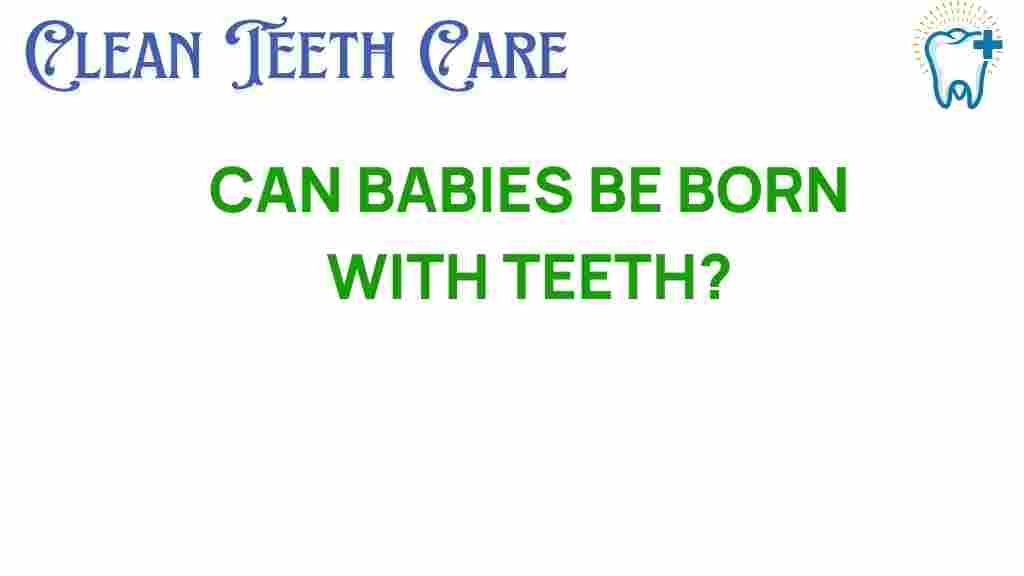The Surprising Truth: Can Babies Really Be Born With Teeth?
When it comes to childbirth and the early stages of infant health, there are countless myths and misconceptions that circulate among expecting parents. One of the most intriguing and surprising questions is: can babies really be born with teeth? The answer is yes, and these neonatal teeth, also known as natal teeth, can raise various concerns and questions for new parents. In this article, we will explore the phenomenon of babies born with teeth, discuss dental anomalies, and provide insights into teething, pediatric dentistry, and the myths surrounding unusual births.
Understanding Neonatal Teeth
Neonatal teeth are teeth that are present at birth or erupt within the first month of life. While it is relatively uncommon, these teeth can be an exciting yet bewildering occurrence for many parents. Here are some key points to understand:
- Incidence: Natal teeth occur in approximately 1 in every 2,000 to 3,000 births.
- Location: Most commonly, these teeth are found in the lower front of the mouth, although they can appear in various locations.
- Composition: Natal teeth might be fully developed or may appear underdeveloped, with a softer structure compared to normal teeth.
Causes of Neonatal Teeth
The exact cause of neonatal teeth remains unclear, but some factors may contribute to their development:
- Genetics: A family history of dental anomalies can increase the likelihood of a baby being born with teeth.
- Hormonal Factors: Certain hormonal changes during pregnancy might influence tooth development.
- Dental Anomalies: Conditions such as ectodermal dysplasia may also lead to unusual dental formations.
Are There Risks Associated with Natal Teeth?
While having teeth at birth can be a novelty, it can also present certain challenges for infant health. Here are a few potential risks:
- Feeding Difficulties: Babies with teeth may experience challenges while breastfeeding or bottle-feeding, as the teeth can cause discomfort to the mother or injury to the baby.
- Infection Risk: Natal teeth may increase the risk of oral infections if they are loose or poorly formed.
- Dental Issues: As these teeth are often not well-formed, they can lead to misalignment of future teeth.
Myths Surrounding Babies Born With Teeth
Despite the fascinating nature of neonatal teeth, many myths have emerged. Here are some common misconceptions:
- Myth 1: Babies born with teeth are always healthier than those without. Truth: Health is not determined by the presence of teeth; prenatal care and genetics play a larger role.
- Myth 2: Natal teeth are a sign of early teething. Truth: Teething usually starts around six months of age, which is different from the presence of natal teeth.
- Myth 3: All babies born with teeth will have dental problems later. Truth: While there may be some risks, many children grow up without significant dental issues.
Step-by-Step Process: What to Do If Your Baby is Born With Teeth
If your baby is born with teeth, it’s essential to take the right steps to ensure their health and well-being. Here is a simple guide:
- Consult a Pediatric Dentist: Schedule an appointment with a pediatric dentist to assess the condition of the teeth and any potential risks.
- Monitor Feeding: Pay close attention to how your baby feeds and watch for any signs of discomfort.
- Practice Oral Hygiene: Gently clean the teeth with a soft cloth or a baby toothbrush to maintain oral hygiene.
- Watch for Loose Teeth: If the teeth seem loose, consult a dentist about the best course of action.
- Regular Check-Ups: Ensure regular dental check-ups to monitor the development of your baby’s teeth.
Troubleshooting Tips for Parents
As a new parent, you may face uncertainties regarding your baby’s dental health. Here are some troubleshooting tips:
- Difficulty Feeding: Consider consulting a lactation expert or pediatrician to address feeding challenges.
- Infection Symptoms: If you notice any swelling, redness, or discharge around the teeth, seek immediate medical attention.
- Teething Signs: If your baby shows signs of teething (such as irritability, drooling, or gum swelling), use teething rings or consult your pediatrician for appropriate relief methods.
The Role of Pediatric Dentistry
Pediatric dentistry plays a crucial role in managing the dental health of infants and children. Here are some key aspects of pediatric dental care:
- Specialized Knowledge: Pediatric dentists are trained to deal with dental anomalies and the unique needs of young patients.
- Preventive Care: Regular check-ups help in identifying dental issues early and preventing future problems.
- Education for Parents: Dentists provide guidance on maintaining infants’ oral health, including appropriate cleaning techniques and dietary advice.
Conclusion
The phenomenon of babies born with teeth is indeed surprising and can bring about various questions regarding infant health and dental care. While neonatal teeth can pose some challenges, understanding the facts and myths surrounding this occurrence can help parents navigate potential concerns with confidence. By consulting with pediatric dentistry professionals and following proper care guidelines, parents can ensure their infants’ dental health is well-managed.
In conclusion, while the presence of teeth at birth is a rare occurrence, it is essential to remember that each baby is unique. By staying informed and proactive, parents can contribute positively to their child’s overall health and well-being. For more information on pediatric dentistry and infant health, consider visiting the American Academy of Pediatric Dentistry for resources and guidance.
For additional insights into common myths about unusual births, check out our article here.
This article is in the category Kids and created by CleanTeethCare Team
